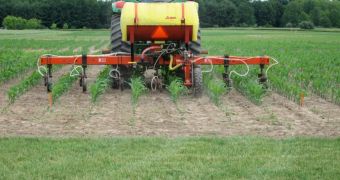Scientists at the Michigan State University (MSU) are currently leading an effort to develop a method of promoting the safe and responsible use of nitrogen-based fertilizers by American farmers.
The research group says that most of the nitrogen contained in these artificial chemicals makes its way into groundwater, rivers, oceans or the atmosphere. Only a small fraction of the compound actually goes on to feed the plants.
Knowing this is very important from an economic perspective, since heavily-used plants such as corn are extremely dependent on nitrogen for their development. Additionally, learning about how the chemical spreads to the environment helps experts figure out how it influenced pollution patterns.
What MSU scientists Phil Robertson and his team want to produce is teach US farmers about how to fertilize their crops in a manner that would ensure both crop productivity levels and the safety of the environment, biodiversity and downstream areas.
Robertson is also the principal investigator on a series of projects currently taking place at the US National Science Foundation's (NSF) Kellogg Biological Station (KBS) Long-Term Ecological Research (LTER) site.
This type of work is being conducted here because more than 92 million acres of land in the United States alone are covered by corn. Given the nitrogen-loving nature of the plant, farmers do not expect soils to be able provide the corn with everything it needs.
Reducing the amount of fertilizers bought and used in the field is also an objective for the research team. "This costs farmers money and degrades water and air quality, with significant health, biodiversity and downstream economic effects.”
“This project is a great example of how long-term, fundamental research can contribute practical solutions to important environmental problems of concern in the U.S.--and ultimately around the world,” NSF LTER program director Matt Kane says.
According to the research team, preventing excess amounts of nitrogen from pouring into the soils, waters or air is a critical priority. If achieved, it could also address issues related to pollution.
“By closely following nitrous oxide, crop yields and other ecosystem responses to fertilizers, we discovered that nitrous oxide emissions increase exponentially and consistently with increasing nitrogen fertilizer use,” Robertson concludes.

 14 DAY TRIAL //
14 DAY TRIAL //